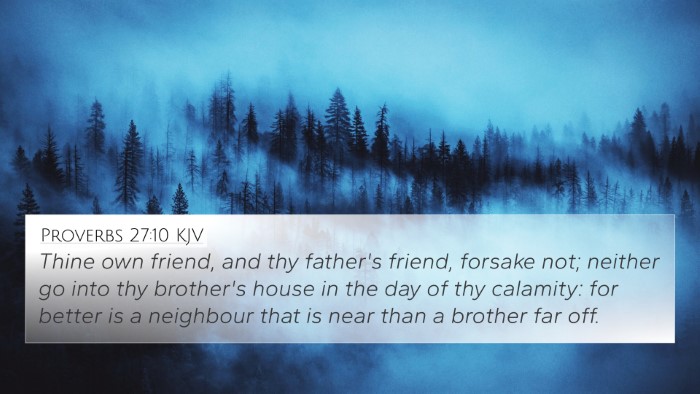Old Testament
Genesis Exodus Leviticus Numbers Deuteronomy Joshua Judges Ruth 1 Samuel 2 Samuel 1 Kings 2 Kings 1 Chronicles 2 Chronicles Ezra Nehemiah Esther Job Psalms Proverbs Ecclesiastes Song of Solomon Isaiah Jeremiah Lamentations Ezekiel Daniel Hosea Joel Amos Obadiah Jonah Micah Nahum Habakkuk Zephaniah Haggai Zechariah MalachiJob 2:11 Similar Verses
Job 2:11 Cross References
Now when Job's three friends heard of all this evil that was come upon him, they came every one from his own place; Eliphaz the Temanite, and Bildad the Shuhite, and Zophar the Naamathite: for they had made an appointment together to come to mourn with him and to comfort him.
Uncover the Rich Themes and Topics of This Bible Verse
Listed below are the Bible themes associated with Job 2:11. We invite you to explore each theme to gain deeper insights into the Scriptures.
Job 2:11 Cross Reference Verses
This section features a detailed cross-reference designed to enrich your understanding of the Scriptures. Below, you will find carefully selected verses that echo the themes and teachings related to Job 2:11 KJV. Click on any image to explore detailed analyses of related Bible verses and uncover deeper theological insights.

Jeremiah 49:7 (KJV) »
Concerning Edom, thus saith the LORD of hosts; Is wisdom no more in Teman? is counsel perished from the prudent? is their wisdom vanished?

Job 42:11 (KJV) »
Then came there unto him all his brethren, and all his sisters, and all they that had been of his acquaintance before, and did eat bread with him in his house: and they bemoaned him, and comforted him over all the evil that the LORD had brought upon him: every man also gave him a piece of money, and every one an earring of gold.

Genesis 25:2 (KJV) »
And she bare him Zimran, and Jokshan, and Medan, and Midian, and Ishbak, and Shuah.

1 Chronicles 1:32 (KJV) »
Now the sons of Keturah, Abraham's concubine: she bare Zimran, and Jokshan, and Medan, and Midian, and Ishbak, and Shuah. And the sons of Jokshan; Sheba, and Dedan.

Genesis 36:15 (KJV) »
These were dukes of the sons of Esau: the sons of Eliphaz the firstborn son of Esau; duke Teman, duke Omar, duke Zepho, duke Kenaz,

1 Corinthians 12:26 (KJV) »
And whether one member suffer, all the members suffer with it; or one member be honoured, all the members rejoice with it.

Isaiah 51:19 (KJV) »
These two things are come unto thee; who shall be sorry for thee? desolation, and destruction, and the famine, and the sword: by whom shall I comfort thee?

Proverbs 27:10 (KJV) »
Thine own friend, and thy father's friend, forsake not; neither go into thy brother's house in the day of thy calamity: for better is a neighbour that is near than a brother far off.

John 11:19 (KJV) »
And many of the Jews came to Martha and Mary, to comfort them concerning their brother.

Hebrews 13:3 (KJV) »
Remember them that are in bonds, as bound with them; and them which suffer adversity, as being yourselves also in the body.

Genesis 37:35 (KJV) »
And all his sons and all his daughters rose up to comfort him; but he refused to be comforted; and he said, For I will go down into the grave unto my son mourning. Thus his father wept for him.

Job 6:14 (KJV) »
To him that is afflicted pity should be shewed from his friend; but he forsaketh the fear of the Almighty.

Job 19:21 (KJV) »
Have pity upon me, have pity upon me, O ye my friends; for the hand of God hath touched me.

Job 42:7 (KJV) »
And it was so, that after the LORD had spoken these words unto Job, the LORD said to Eliphaz the Temanite, My wrath is kindled against thee, and against thy two friends: for ye have not spoken of me the thing that is right, as my servant Job hath.

Proverbs 18:24 (KJV) »
A man that hath friends must shew himself friendly: and there is a friend that sticketh closer than a brother.
Job 2:11 Verse Analysis and Similar Verses
Understanding Job 2:11
Job 2:11 states: “Now when Job's three friends heard of all this evil that was come upon him, they came every one from his own place; Eliphaz the Temanite, and Bildad the Shuhite, and Zophar the Naamathite: for they had made an appointment together to come to mourn with him and to comfort him.” This poignant verse introduces the key figures in Job’s story and sets the stage for their dialogue regarding suffering and faith.
Summary of Insights
The verse serves as a significant point in the narrative of Job. Here’s a combined interpretation based on public domain commentaries:
- Matthew Henry: Henry notes the intention of Job’s friends to comfort him. The gathering of these friends highlights the natural human response to tragedy, underscoring the importance of community support during times of suffering. Each friend's unique background represents different perspectives that contribute to a broader discussion on the nature of suffering.
- Albert Barnes: Barnes emphasizes the expected outcome of their visit. The friends came with noble intentions, yet their subsequent conversations with Job reveal a misunderstanding of his plight. Thus, they symbolize a common error in offering comfort that inadvertently shifts towards judgment.
- Adam Clarke: Clarke elaborates on the characters of the friends, suggesting that their varying backgrounds represent different philosophical approaches to suffering and faith. Their decision to meet demonstrates solidarity, yet their dialogue will reveal profound theological disagreements.
Thematic Connections
This verse opens a conversation about suffering, friendship, and divine justice, which resonates throughout the Bible. Here are some key thematic connections that reflect cross-references with other biblical texts:
- Proverbs 17:17: "A friend loves at all times, and a brother is born for adversity." This supports the idea of loyal friendship in times of trouble.
- Ecclesiastes 4:9-10: "Two are better than one, because they have a good reward for their labor. For if they fall, one will lift up his companion." This highlights the necessity of companionship in hardship.
- Luke 22:32: "But I have prayed for you, that your faith should not fail; and when you have returned to Me, strengthen your brethren." This illustrates the importance of spiritual support among friends.
- James 5:16: "Confess your trespasses to one another, and pray for one another, that you may be healed." This reinforces the role of community in healing and restoration.
- Romans 12:15: "Rejoice with those who rejoice, and weep with those who weep." This verse connects to the empathetic response expected from Job’s friends.
- Galatians 6:2: "Bear one another's burdens, and so fulfill the law of Christ." It speaks to the essence of true friendship—sharing in each other's struggles.
- 2 Corinthians 1:4: "Who comforts us in all our tribulation, that we may be able to comfort those who are in any trouble." This can be applied as a commentary on Job’s friends' intended role as comforters.
Historical and Cultural Context
Understanding the historical and cultural context is vital for interpreting this passage. Job's three friends hail from different backgrounds, which indicates the universal nature of their endeavor to provide comfort. In ancient Near Eastern culture, community solidarity was essential in response to tragedy.
Reasons for Their Arrival
Job’s friends traveled from afar, suggesting that they possessed a deep respect for Job’s character despite the calamities that had befallen him. Their actions reflect a critical attribute of friendship and loyalty, which is an important theme in Biblical literature.
Cross-Referencing Techniques
When studying Job 2:11, cross-referencing can deepen understanding. Here are some techniques using Bible reference resources:
- Use a Bible Concordance: To identify terms related to friendship and suffering.
- Employ a Cross-Reference Guide: To explore related themes found across various books of the Bible.
- Look for Chain References: To see thematic connections between the Old Testament and the New Testament.
- Study Parallel Passages: By comparing accounts in other scriptures that discuss similar themes of suffering.
Conclusion
In conclusion, Job 2:11 is more than merely a narrative element; it initiates a critical exploration of the nature of suffering, friendship, and the quest for understanding in pain. The insights from Matthew Henry, Albert Barnes, and Adam Clarke enrich our understanding of the profound themes contained in this verse. Linking biblical scriptures through cross-references promotes a broader comprehension of scripture, facilitating a deeper engagement with God’s word.











